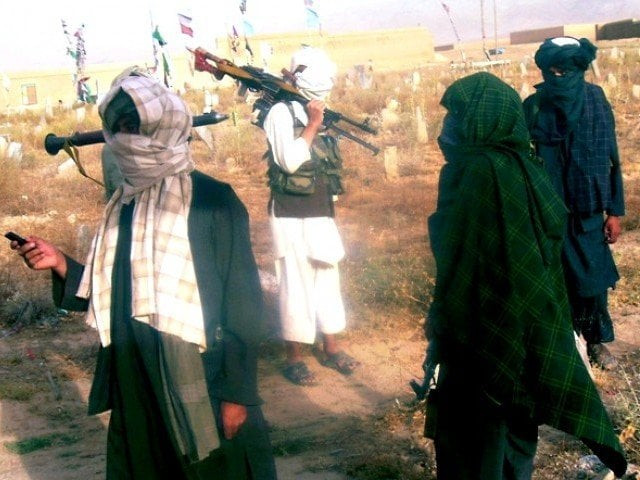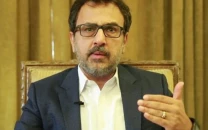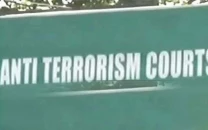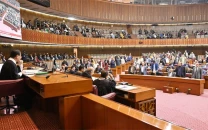Revealed: Govt decides to ban Haqqani Network, JuD
In all 12 outfits added to proscribed organisations’ list which now features 72 groups

In all 12 outfits added to proscribed organisations’ list which now features 72 groups. PHOTO: AFP
Pakistan has decided to ban the Haqqani Network, Jamaat-ud-Dawa (JuD) and 10 more organisations in a move described by security analysts as a ‘paradigm shift’ in the country’s security policy. Confirming the development, senior officials told The Express Tribune that a formal announcement to this effect would be made in ‘coming days’.
The decision came a day after the US State Department declared the fugitive chief of the Tehreek-e-Taliban Pakistan Mullah Fazlullah as a ‘Specially Designated Global Terrorist’. Mullah Fazlullah had claimed responsibility for the December 16 bloody massacre of schoolchildren in Peshawar.

The methodical killings of the schoolchildren prompted an overhaul of the country’s policy to counter the menace of terrorism. Government and opposition parties approved a wide-ranging National Action Plan against terrorism which, inter alia, envisages establishment of military courts to expedite trials of terror suspects.
The Haqqani Network was designated as a terrorist organisation by the United States in September 2012. Subsequently, the UN Security Council’s Taliban sanctions committee also added the group to a UN blacklist.
The network, founded by Afghan warlord Jalaluddin Haqqani, has been blamed for some of the most spectacular attacks on US-led foreign forces in Afghanistan. The network was believed to be using North Waziristan as a springboard for launching such attacks until the Pakistani military launched Operation Zarb-e-Azb in mid-June, last year.

Security analysts say that banning the JuD is also a significant development as India, as well as the US, have long considered the charity run by Hafiz Muhammad Saeed as a front for the Lashkar-e-Taiba militant outfit which has been blamed by New Delhi for masterminding the 2008 terrorist attacks on landmarks in Mumbai.
“It’s our first step towards execution of the National Action Plan. The nation will see more positive steps towards dismantling militant groups. Both civilian and military leadership decided to ban the Haqqani Network and Jamaat-ud-Dawa,” a senior intelligence official confirmed to The Express Tribune on Wednesday.
The decision will certainly be welcomed by Washington and Kabul as well as New Delhi, analysts believe.
Pakistan banned 12 new organisations days before US Secretary of State John Kerry visited Pakistan this week, officials at the interior ministry revealed. With this latest addition, they explained, the number of proscribed outfits in Pakistan has reached 72.
Around 23 banned organisations were functioning with different names — like Jaish-e-Muhammad was operating as Khuddam-e-Islam or Al Rahmat Trust, they stated.
According to the list – a copy of which is available with The Express Tribune – the government banned Harkat-ul-Jihad Islami, the organisation which is accused of conducting terrorist attacks in Pakistan and India. Its operational commander, Ilyas Kashmiri, was killed in a US drone strike in South Waziristan in 2011.
The list also features Harkat-ul-Mujahidin, the group accused of operating in disputed Kashmir state. Falah-e-Insaniat Foundation, a welfare wing of the JuD, has also been banned. The government has also outlawed right-wing organisation Ummah Tameer-e-Nau, which is accused of supplying sensitive information to militants.
Similarly, the government has also banned Haji Khairullah Hajji Sattar Money Exchange, Rahat Limited and Roshan Money Exchange which were placed under sanctions by the UN Security Council and the United States in 2012 as according to them both were being used by Taliban commanders to fund operations in Afghanistan and Pakistan. The Al Akhtar Trust and Al Rashid Trust have also been banned for working with al Qaeda and Jaish-e-Muhammad and facilitating activities of both groups.
Former interior secretary Tasneem Noorani described the development as a significant move toward the execution of National Action Plan against terrorism. “This move shows that the government is serious to dismantle terror groups in the country,” he said. “The ban on Haqqani Network means distinction of good and bad Taliban no longer exists in Pakistan,” he told The Express Tribune.
JuD Islamabad chapter’s spokesperson Asif Khursheed said: “Jamaat-ud-Dawa is a purely welfare and charity organisation and has never been involved in bad motives. Even, the Supreme Court of Pakistan has justified our stance in the past,” he claimed. Another JuD office bearer, however, revealed that last week the "home department sent us a letter informing us that the Jamaat is being kept on the watch-list with some two dozen other organisations."
The executive director of the Pakistan Institute for Peace Studies, Amir Rana, also called it a ‘significant move’. “This shows the civilian and military leadership are serious to choke militants operating from Pakistan’s territory,” he told The Express Tribune.
Banning an organisation means freezing its assets, blocking funding sources and monitoring them properly, he said. In the next move, the offices, infrastructures and networks of the proscribed groups will be banned, he added. Though there is no specific mechanism of banning any organisation, the government can review its policy towards banned outfits if they change their behaviour.
Published in The Express Tribune, January 15th, 2015.



















COMMENTS
Comments are moderated and generally will be posted if they are on-topic and not abusive.
For more information, please see our Comments FAQ